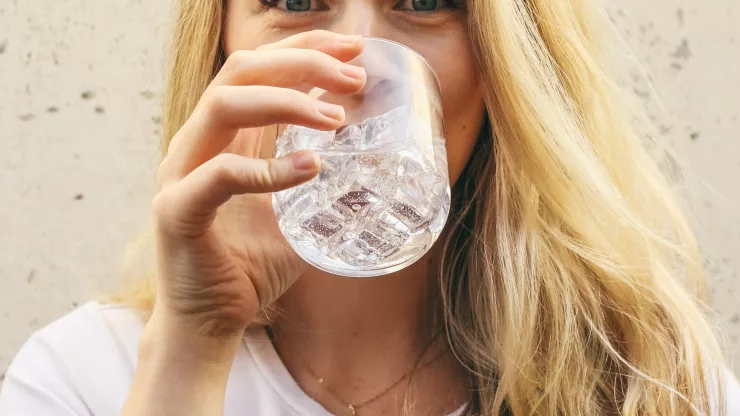Dehydration is a common problem that can lead to serious health issues. The good news is that staying hydrated can be easy and enjoyable.
Drinking enough water is essential to maintain good health. In this article, we’ll explore the benefits of regular hydration, how much water you should drink, and tips for staying hydrated.
Jump to Section
Introduction
Water is essential for life, and staying hydrated is important for good health. The human body is made up of about 60% water, and every cell, tissue, and organ requires water to function properly.
Without water, the body can’t regulate temperature, remove waste, or transport nutrients.
In this article, we’ll explore the health benefits of staying hydrated, how much water you should drink, and tips for staying hydrated.
Why Hydration is Important
Water is involved in many of the body’s functions, including regulating body temperature, transporting nutrients, lubricating joints, and removing waste.
When the body doesn’t have enough water, it can lead to dehydration, which can cause fatigue, headaches, and other health problems.
Staying hydrated can help prevent dehydration and keep the body functioning properly.
The Benefits of Hydration
Drinking enough water has many health benefits. Here are just a few:
Improved Physical Performance
Drinking enough water is essential for good physical performance. When we exercise, our bodies lose water through sweat, and if we don’t replace that water, we can become dehydrated.
Dehydration can lead to decreased endurance, strength, and reaction time. In fact, even mild dehydration can have a negative impact on physical performance.
To illustrate this point, here’s a table of the effects of dehydration on physical performance:
| Level of Dehydration | Effect on Physical Performance |
|---|---|
| 1% | Impaired thermoregulation |
| 2% | Impaired performance |
| 3% | Reduced muscular endurance |
| 4% | Reduced muscle strength |
| 5% | Heat exhaustion |
| 6% | Heat stroke |
Boosted Brain Function
Drinking enough water can also have a positive impact on brain function.
The brain is made up of about 73% water, and dehydration can lead to decreased cognitive function, mood swings, and headaches.
When we drink enough water, we can think more clearly, focus better, and have better memory recall.
Reduced Risk of Health Issues
Staying hydrated can also help reduce the risk of health issues, such as kidney stones, urinary tract infections, and constipation. Drinking enough water helps flush out toxins and waste from the body, which can help prevent these and other health problems.
Here are some other health benefits of staying hydrated:
- Helps regulate body temperature
- Improves heart health
- Helps with weight loss
- Boosts immune system
- Reduces inflammation
Improved Digestion
Drinking enough water is essential for good digestion. Water helps move food through the digestive tract and prevents constipation.
It also helps the body absorb nutrients from food.
Increased Energy Levels
When we’re dehydrated, we can feel tired and sluggish. Drinking enough water can help boost energy levels and improve mood.
In fact, even mild dehydration can lead to fatigue and decreased alertness.
Better Skin Health
Drinking enough water can also have a positive impact on skin health. When we’re dehydrated, our skin can become dry and dull.
Drinking enough water can help keep the skin hydrated and improve its appearance.
How Much Water Should You Drink?
The amount of water you should drink each day depends on several factors, including your age, sex, weight, activity level, and climate. Here are some guidelines for determining your daily water needs:
Factors that Affect Hydration Needs
- Age: Older adults may need to drink more water to stay hydrated.
- Sex: Men generally need to drink more water than women.
- Weight: Heavier people need to drink more water than lighter people.
- Activity level: People who are more active need to drink more water.
- Climate: People who live in hot or humid climates need to drink more water.
Recommended Daily Water Intake
Here are the recommended daily water intake amounts based on age and sex:
| Age | Male | Female |
|---|---|---|
| 0-12 months | N/A | N/A |
| 1-3 years | 1.3L | 1.3L |
| 4-8 years | 1.7L | 1.7L |
| 9-13 years | 2.4L | 2.1L |
| 14-18 years | 3.3L | 2.3L |
| 19+ years | 3.7L | 2.7L |
Note: These values are based on average needs and may vary depending on individual factors.
Tips for Staying Hydrated
Here are some tips for staying hydrated:
- Carry a water bottle with you
- Drink water with every meal and snack
- Eat foods with high water content, such as fruits and vegetables
- Drink water before, during, and after exercise
- Set reminders to drink water throughout the day
- Avoid sugary drinks and alcohol, which can dehydrate you
Foods that Help with Hydration
Here are some foods with high water content that can help keep you hydrated:
- Watermelon
- Cucumber
- Strawberries
- Lettuce
- Tomatoes
- Bell peppers
- Pineapple
- Oranges
- Grapes
- Carrots
Hydrating Beverages
Here are some beverages that can help keep you hydrated:
- Water
- Coconut water
- Sports drinks
- Herbal tea
- Milk
- Smoothies
Signs of Dehydration and What to Do
Dehydration can have serious health consequences. Here are some signs of dehydration and what to do if you experience them:
Mild to Moderate Dehydration Symptoms
- Dry mouth and throat
- Thirst
- Dark yellow urine
- Fatigue
- Headache
- Dry skin
- Dizziness
If you experience these symptoms, drink water or a hydrating beverage and rest in a cool, shaded place.
Severe Dehydration Symptoms
- Rapid heartbeat
- Breathing difficulties
- Sunken eyes
- Confusion
- Irritability
- Unconsciousness
If you experience these symptoms, seek medical attention immediately.
Prevention and Treatment of Dehydration
Here are some tips for preventing and treating dehydration:
- Drink plenty of water and hydrating beverages.
- Avoid sugary and alcoholic drinks, which can dehydrate you.
- Eat foods with high water content, such as fruits and vegetables.
- Rest in a cool, shaded place if you start to feel dehydrated.
- Seek medical attention if you experience severe dehydration symptoms.
Conclusion
Staying hydrated is essential for good health. Drinking enough water can improve physical performance, boost brain function, reduce the risk of health issues, and improve digestion, energy levels, and skin health.
The amount of water you need to drink each day depends on several factors, but a good rule of thumb is to drink enough water so that you’re not thirsty.
Use the tips in this article to help you stay hydrated and healthy.
Frequently Asked Questions
How do I know if I’m drinking enough water?
A good way to tell if you’re drinking enough water is to check the color of your urine. If it’s light yellow or clear, you’re probably drinking enough water.
If it’s dark yellow or amber, you may need to drink more water.
Can I drink too much water?
Yes, it’s possible to drink too much water, which can lead to water intoxication. This can be dangerous, especially if you drink a large amount of water in a short period of time.
Stick to the recommended daily water intake amounts to avoid this.
Does drinking water help with weight loss?
Drinking water can help with weight loss by increasing feelings of fullness and boosting metabolism. It can also help flush out toxins and waste

With a deep passion for personal development, Ben has dedicated his career to inspiring and guiding others on their journey towards self-improvement.
His love for learning and sharing knowledge about personal growth strategies, mindfulness, and goal-setting principles has led him to create My Virtual Life Coach.
Contact Ben at [email protected] for assistance.




